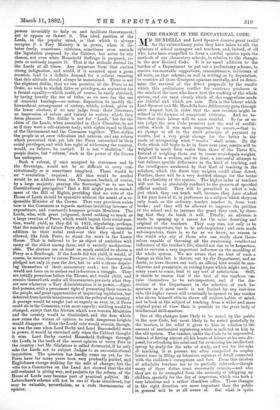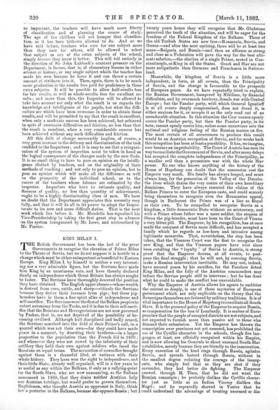THE CHANGE IN THE EDUCATIONAL CODE.
MR. MUNDELLA and Lord Spencer deserve great credit' for the extraordinary pains they have taken to sift the opinions of school managers and teachers, and, indeed, of all who have been compelled to form a careful opinion upon the methods of our elementary schools, in relation to the changes in the new Revised Code. It is no small addition to the burden of a Department to put out a preliminary scheme, to receive innumerable suggestions, remonstrances, criticisms of all sorts, on that scheme, as well in writing as by deputation, to consider all these divergent opinions carefully, and to deter- mine the survival of the fittest proposals by the results which this preliminary conflict for existence produces in the minds of the men who know best the working of the whole system, and see most clearly which of the suggestions made are fruitful and which are vain. This is the labour which Lord Spencer and Mr. Mundella have deliberately gone through since August last, in order that the new revision might be refined in the furnace of competent criticism. And we be-
lieve that their labour will be most fruitful. So far as we can judge, the new Code promises just the sort of modifi- cation which it was most important to secure,—that is, no change at all in the strict principle of payment by results, but a very great change for the better in the mode of interpreting what " results " shall mean. By the Code which will begin to be in force next year, results will be weighed in much finer scales than those of the Three R's. Instead of weighing them out by coarse avoirdupois weights, there will be a serious, and we trust, a successful attempt to test delicate specific differences in the kind of teaching, and the intelligence awakened by that kind of teaching in the scholars, which the finest troy weights could alone detect. Further, there will be a very decided change for the better in the elasticity of the system. The higher order of teachers will not be so absolutely confined to the grooves of specified official method. They will be permitted to select a sub- ject which they can teach well, because they have studied it for pure love of it, in preference to a subject which they can only teach as the ordinary teacher teaches it, from text- books ; and they will be allowed to improve the position of the school and to increase the grant they earn, by show- ing that they do teach it well. Finally, an advance is made in opening up a career for the more deserving and original of the teachers. They may rise, not only to be assistant-inspectors, but to be sub-inspectors ; and once made sub-inspectors, there is, so far as we know, no reason in the world why any of them who can really show them- selves capable of throwing off the straitening intellectual influences of the teacher's life, should not rise to be Inspectors, and to exercise a very important influence on the moulding of the whole system. We are aware that no hint of such a change as this last is thrown out by the Department, and no doubt, to have thrown out such an official hint would be mis- chievous and premature, as raising hopes which might not, for many years to come, lead to any sort of satisfaction. Still, it stands to reason that if the best of the teachers can raise themselves to be sub-inspectors, and if the dis- cretion of the Department in the selection of such In- spectors as it most needs is not limited by any cast-iron rule, the higher career will eventually be opened to any teacher who shows himself able to throw off routine habits of mind, and to look at the subject of teaching from a wider and more original point of view than is possible to the great body of intellectual drill-masters.
One of the changes least likely to be noted by the public in the new Code, but most likely to be noted gratefully by the teacher, is the relief it gives to him in relation to the amount of mechanical registering which is inflicted on him by the old system. The teacher, under the Code to be superseded, instead of having almost all his hours of leisure at his own dis- posal, for refreshing his mind and for recovering his intellectual spring by study for the sake of study, and not for the sake of teaching, is at present too often compelled to employ leisure time in filling up laborious registers of detail connected with the children's exemptions and fees. From this incubus of schedules teachers are to be partially relieved,—though many of these duties must necessarily remain,—and also they are to be exempted from the necessity of whipping up children specially for the day of inspection, which was both a very laborious and a rather thankless office. These changes in the right direction are more important than the public in general will be at all aware of. But what is quite
as important, the teachers will have much more liberty of classification and of planning the course of study. The age of the children will not hamper that classifica- tion, as it has been hitherto allowed to do. And as we have said before, teachers who care for one subject more than they care for others, will be allowed- to select that subject as one of the extra subjects of the school, simply because they know it better. This will tell entirely in the direction of Sir John Lubbock's constant pressure on the Department, in favour, that is, of elementary lessons in either science or history, or any single subject which the teacher has made his own because he loves it and can throw a certain amount of vividness into it. Then, again, there is to be much more graduation in the results fees paid for proficiency in these extra subjects. It will be possible to allow half-results fees for fair results, as well as whole-results fees for excellent re- sults ; and more than this, the Inspector will be allowed to take into account not only what the result is as regards the knowledge and intelligence of the pupils, but what the diffi- culties are which have been overcome in order to obtain these results, and will be permitted to say that the result is excellent, when only a moderate success has been achieved, but achieved in spite of enormous difficulties and friction, no less than that the result is excellent, when a very considerable success has been achieved without any such difficulties and friction.
All this drift of change necessarily implies, of course, a very great increase in the delicacy and discrimination of the task confided to the Inspectors ; and it is easy to see that a reorgani- sation of the system of inspection must be taken in hand as the logical consequence of the changes made by the new Code. It is no small thing to have to pass an opinion on the intelli- gence elicited by teachers, and on the originality of their methods of teaching ; and not only to pass an opinion, but to pass an opinion which will make all the difference as well to the prosperity of the individual school, as to the career of the teachers whose labours are estimated by the inspector. Inspectors who have to estimate quality, and fineness of quality, no less than quantity of achievement, ought to be a highly discriminating class of men. We have no doubt that the Department appreciates this necessity very fully, and that it will do all in its power to adapt the Inspec- torate to its new and more difficult duties. That is the next work which lies before it. Mr. Mundella has signalised his Vice-Presidentship by taking the first great step in advance on the system inaugurated by Mr. Lowe, and nationalised by Mr. Forster.



































 Previous page
Previous page